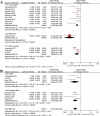High tumor mutation burden predicts better efficacy of immunotherapy: a pooled analysis of 103078 cancer patients
- PMID: 31428527
- PMCID: PMC6685508
- DOI: 10.1080/2162402X.2019.1629258
High tumor mutation burden predicts better efficacy of immunotherapy: a pooled analysis of 103078 cancer patients
Abstract
The relation between tumor mutation burden (TMB) and outcome of cancer patients receiving immunotherapy has been reported. This study aimed to evaluate the prognostic role of TMB in cancer patients receiving immunotherapy. Databases including Embase, PubMed, and the Cochrane library were systematically searched to identify potentially eligible studies until Sep 2018 without language limitation. Studies assessing high versus low TMB in predicting survival of various cancer patients were selected. The pooled analyses were conducted using hazard ratio (HR) of high versus low TMB for overall survival (OS) and progression-free survival (PFS), and the odds ratio (OR) for overall response rate (ORR). The primary endpoint was OS. Secondary outcomes were PFS and ORR. A total of 45 studies consisting of 103078 cancer patients were included. The combined results showed that high TMB was associated with better OS (HR = 0.40; 95% confidence interval (CI):0.30-0.53; p< .00001), PFS (HR = 0.37; 95% CI: 0.26-0.53; p< .00001) and ORR (OR = 4.62; 95%CI: 2.90-7.34; p< .0001) when treated with immunotherapy. In studying patients with high TMB, these patients had improved OS (HR = 0.69; 95%CI: 0.47-1.03; p= .07) when comparing immunotherapy to chemotherapy. Subgroup analyses suggested that the prognostic role of TMB was independent of cancer types and TMB detection methods (all p< .05). Our findings suggest that high TMB is associated with better survival in cancer patients receiving immunotherapy. For cancer patients with high TMB, immunotherapy could be considered.
Keywords: Tumor mutation burden; cancer; immunotherapy; prognosis; survival.
Figures





References
Publication types
LinkOut - more resources
Full Text Sources
